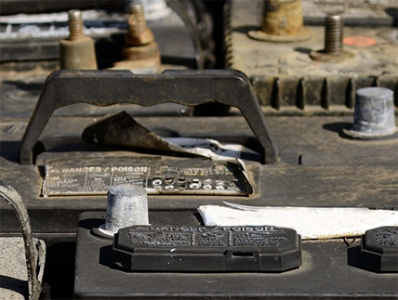Tipton recycling plant gets approval to recycle batteries
 A recycling site in Tipton has received approved battery treatment operator (ABTO) status from the Environmental Agency, which enables it to immediately commence manual recycling operations of lead-acid batteries.
A recycling site in Tipton has received approved battery treatment operator (ABTO) status from the Environmental Agency, which enables it to immediately commence manual recycling operations of lead-acid batteries.
The approval authorises Recyclus Group Ltd to produce up to 15,000 metric tonnes (MT) of lead per year from the recycling of lead-acid batteries and store up to 300MT of inbound stock at any one time on site.
Recyclus Group provides a national recycling initiative that supports the transition to carbon neutrality. Its battery recycling capacity could be essential in the shift from fossil fuels to electric transportation as the demand for the raw materials used in battery manufacturing is anticipated to substantially increase.
Recyclus Group’s new ABTO status marks the beginning of its phase one of recycling operations, which will move to a fully automated recycling process in phase two, following receipt of the variation of licence.
The Recyclus system recycles the entire battery into separate constituent parts, to ensure recovery of lead, acid, and plastic materials, which are then reused to support a wide range of industries. For example, the hard lead can be used in grids and terminals, the soft lead for battery paste, and the sulphuric acid into fertilisers for agricultural use.
Recyclus is 49 per cent owned by Technology Minerals Plc, the first listed UK company focused on creating a sustainable circular economy for battery metals.
Robin Brundle, Chairman of Technology Minerals, said: “We are delighted to have our ABTO status confirmed by the Environmental Agency, so we can kick-start recycling operations, close deals in the pipeline, and start generating revenues from this site. Once fully operational, the Tipton plant positions us to become one of the leading accredited battery recyclers internationally.”
He went on to explain: “The lead-acid battery recycling industry is currently a major polluter, with over 18,000 tonnes of spent batteries incinerated or sent to landfill each year in the UK alone. It is vital that companies look to strip back ‘greenwashing’ and promote homegrown waste management solutions if the UK is to achieve its COP26 net zero targets.
“Our operations will help to divert waste from landfill, enabling key resources to be kept in use for longer, minimising waste and reducing the environmental impacts of spent batteries. These efforts underscore our commitment to developing a truly circular economy for battery metals that will help propel the green transition and meet the net zero 2050 targets. We look forward to reporting on our progress in the coming weeks and months.”
To find out how your Sandwell business can carry out its work without negatively affecting the environment for future generations visit our Going greener page. Our ‘going greener’ resources can help your business play its part in conserving energy, reducing carbon use and carbon dioxide emissions, and helping to prevent human-made climate change.






